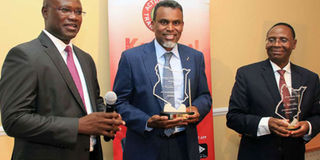Take war on graft seriously, Wilfred Kiboro urges State

From right: Nation Media Group Chairman Wilfred Kiboro, Director of Public Prosecutions Noordin Haji and Kenya Editors Guild Chairman Churchill Otieno during a luncheon at the Sarova Stanley Hotel, Nairobi, on March 26, 2019. PHOTO | JEFF ANGOTE | NATION MEDIA GROUP
What you need to know:
Dr Wilfred Kiboro chair also reminded the government not to expect the media to be a cheerleader.
As a member of Multi-sectoral Initiative against Corruption, Dr Kiboro expressed hope that the current efforts to fight graft will bear fruit.
Media Council of Kenya CEO David Omwoyo said a number of threats have been issued against media houses reporting on graft.
A member of the Multi-sectoral Initiative against Corruption has questioned the silence of the two highest offices in the land after reports emerged that con schemes were being coordinated from there.
Dr Wilfred Kiboro, who is also the chairman of the Nation Media Group (NMG) board, wondered why the offices of the President and Deputy President were silent even after a section of the media published stories about unscrupulous individuals, who pretended to work in their premises, duped several people into parting with millions of shillings to finance “restricted” tenders.
“A few months ago, there was a report that some of these people sell fake things. The deals were being cut in the Office of the President and the Office of the Deputy President,” Dr Kiboro said on Tuesday.
“And that thing just died a natural death. It’s a serious indictment when such allegations are made. I would have thought that the Office of the President would say, ‘Look this was fake news; nothing like that happened’; or the office of the Deputy President saying, ‘Those deals were not cut in my office and that is fake news’."
QUIET
“But the thing died quietly. So, people are left to their imaginations as to whether there was any truth in that matter,” he added.
Dr Kiboro made the remarks during a luncheon organised by the Kenya Editors’ Guild at a Nairobi hotel, whose theme was “Media and Corruption: The Public Interest.”
“Kenyans need to acknowledge that something has seriously gone wrong with our society. When things that we hear every day from the media don’t prick our conscience, something is wrong,” he observed.
He also criticised the Judiciary for appraising itself. “This idea of self-appraisal, where the Judiciary gives itself very high scores for their work, is misplaced,” he said.
He went on: “I don’t want this to be taken as an attempt to fight the Judiciary, but until Wanjiku sees a number of big, fat cats who have looted public money behind bars, and those cases being dispensed within a reasonable time, Wanjiku will never be convinced that the Judiciary is not sleeping on its job.”
CORRUPTION
Dr Kiboro, whose speech was about giving an insider’s perspective on how the media has been tackling corruption, said media houses have been doing what the common citizen (Wanjiku) cannot.
“Wanjiku cannot walk to State House today and ask the country’s CEO why people are dying of hunger in certain parts of this country 56 years after independence, but the media can,” he said.
The NMG chair also reminded the government not to expect the media to be a cheerleader.
“The media is not really there to support the government, we are here to serve the society,” he said.
The Multi-sectoral Initiative against Corruption, which Dr Kiboro is a member, was created last year to enable the private sector put a united front in the fight against graft.
It is chaired jointly by Mr Lee Karuri of Kenya Professional Sector Alliance and Mr Patrick Obath, the board chairman of the African Alliance Investment Bank Kenya Limited.
BIG FOUR
As a member of the initiative, Dr Kiboro expressed hope that the current efforts to fight graft will bear fruit.
“I still believe that this fight against corruption can be won,” he said.
The luncheon, a function of the Press Club initiative by the editors’ team, brought together stakeholders from various sectors, with the keynote speaker being Director of Public Prosecutions Noordin Haji.
Kenya Editors’ Guild chairman Churchill Otieno said, “We think editors find lots of value in these conversations, and we take them seriously as you can see from the turnout today."
Other speakers at the event included US Ambassador to Kenya Klye McCarter, Law Society of Kenya (LSK) President Allen Gichuhi, Media Council of Kenya CEO David Omwoyo, NMG’s Editorial Director Mutuma Mathiu and Transparency International Kenya’s Communication officer Abraham Mariita.
The US envoy said Kenya stands to make big leaps if it eradicates corruption.
“Based on the media reporting, the cost of corruption can cover 100 per cent of the cost of the Big Four (Jubilee government’s development pillars). Which would it be: Gains for the individuals or gains for all?” he posed.
The LSK head voiced his support for measures to avoid unnecessary adjournment of graft cases and wondered whether special prisons should be created for those convicted.
THREATS
Mr Omwoyo said a number of threats have been issued against media houses reporting on graft.
“Nine out of 10 corruption cases that the media serialises turn out to be true, and in nine out of 10 of such stories, the media gets threats,” added Mr Omwoyo.
Mr Mathiu said that in light of the threats, it is time for journalists to be strong.
“I also know, being a Christian, that there is a season for everything. And for us in the media, this is the season to be strong because our profession needs us -- and so does our country,” he said.
Mr Mariita of the Transparency International, co-convener of the gathering, urged editors to balance their quest for cash from the government vis-à-vis being a public watchdog.





